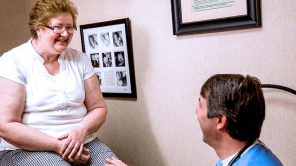
Case study: Close care gaps by chart prepping a week ahead
Researchers have identified top performers on key financial and clinical metrics across the athenahealth network — and are uncovering the innovations that drive their success. Here's a snapshot of one tactic on the road to lower cost, higher value care.
The problem
At Valley Medical Group, a multi-specialty network in Western Massachusetts, gaps in screening and incomplete charts meant practitioners didn't have all the tools they needed for clinical decision-making and care recommendations. They weren't hitting quality targets — and were missing opportunities to support their patients during those few times a year when a patient was right in front of them.
The solution
To ensure complete information for every patient and every visit, Valley Medical Group adopted the Proactive Office Encounter Team — known as POET — one of many cultural leftovers from their time as a part of Kaiser Permanente.
A team-based workflow, POET queues up care plans for every scheduled visit a full week before the patient arrives. Teams include practitioners, nurses, medical assistants, and nurse managers — along with reception staff, lab and radiology staff, and outreach personnel — each with a defined role in identifying care gaps and addressing them before the visit:
1 week prior - The team reviews the patient chart and identifies any required lab tests, missing results, or other critical information.
3 days prior - Reception staff review the schedule and identify patients who need colorectal cancer screening or chlamydia testing. These patients receive test kits at check-in.
Day of visit - All available documentation and results are given to the provider, who is then free to focus the visit on care objectives, rather than gaps in care.
Post-visit - At check-out, reception staff provide a written patient care summary (or deliver it via the patient portal), schedule any follow-up tests, and address any patient-specific needs outlined by the provider.
“The idea is to get the boring stuff done so that there's time and space for the caregiver and patient to interact," says Martha Mastroberti, Valley Medical Group's manager of healthcare informatics.
The outcome
When researchers analyzed performance on key quality metrics across the athenahealth network, Valley Medical Group emerged as one of the top 10 percent of performers. Tactics from the POET workflow — such as identifying patients who need colorectal cancer screenings — helped lead to those strong results.
And one powerful side effect, says president Joel Feinman, Ph.D., is patients' perception of the organization: They know a care team is thinking about their health, even when they're not in the office.
“Each patient deserves to have everything taken care of every time they're here," Feinman says. “So we work hard to make sure they do."
Data analysis and research by Stewart Richardson, David Clain, and Erica Granor. Lia Novotny is a contributing writer for athenaInsight. Image credit: Getty Images











